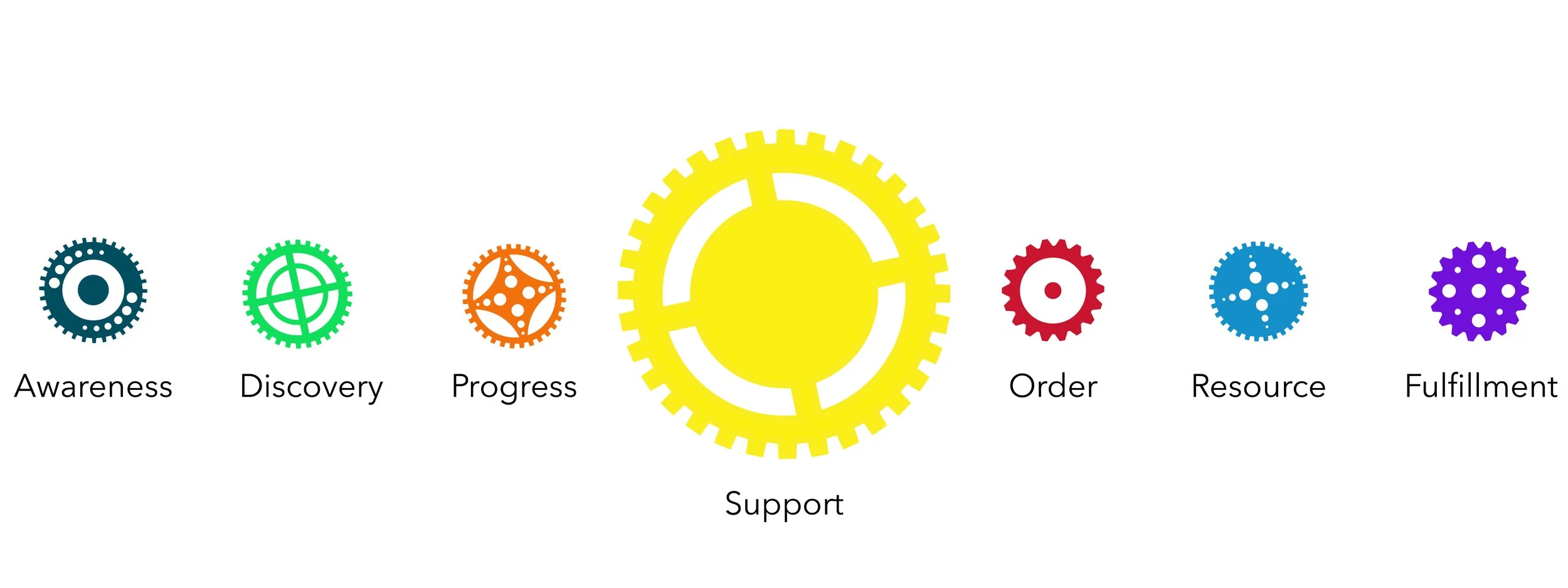
INDUSTRIOUS DESIGN
WHAT DRIVES YOU?
When you know your intrinsic motivational drive, you stop living by trial and error and start living with precision. Instead of trying to be everything, you begin focusing on becoming more of who you already are, on purpose.
Support
READ ALONG | JUST LISTEN
Industrious designs are driven by the motivational drive of Support, which focuses on reliability, dedication, and providing strength to ensure stability and continuity. For those with an Industrious design, being dependable and contributing to the well-being of others is not just a role—it’s a defining purpose that shapes how they approach life, relationships, and work. The Support drive is the key force behind this design, influencing their actions, interactions, and commitments, as they prioritize sustaining the people, tasks, and systems they care about.
-
In an Industrious design, the Support drive is central to how individuals engage with the world. They see themselves as pillars within their environments, providing the stability and strength needed for people and processes to thrive. Support encourages them to focus on the needs of others, work diligently to fulfill commitments, and maintain a steady, practical approach. This drive gives Industrious individuals a sense of purpose, as they recognize that their role in upholding and maintaining systems and relationships is essential for collective success.
-
Driven by Support, Industrious individuals are characterized by their dedication and steadfastness. They are reliable, dependable, and take pride in consistently meeting the expectations placed upon them. Their dedication means they approach every task and responsibility with a serious commitment, doing what is necessary to see things through to completion. This steadfast nature makes them highly valued in teams and communities, as others know they can rely on them to show up and provide ongoing, practical support.
-
The Support drive instills a strong focus on practicality and efficiency in Industrious individuals. They are motivated to ensure that systems and processes run smoothly, often looking for the most effective ways to accomplish tasks. Their practical approach enables them to streamline efforts, focus on what’s necessary, and avoid waste or unnecessary complexity. They are naturally inclined to find efficient solutions that benefit everyone involved, making them effective at managing resources and organizing tasks in a way that promotes steady progress.
-
Industrious individuals, driven by Support, prioritize stability and continuity. They understand that for projects, teams, and relationships to flourish, they must have a foundation of consistency. This commitment to stability shapes their approach, as they work to create an environment where disruptions are minimized, and people feel secure. They are often drawn to routines and processes that promote order, as these provide the structure needed to maintain smooth operation and prevent unnecessary challenges or setbacks.
-
For those with an Industrious design, fulfillment is found in helping others succeed. They are deeply motivated by the knowledge that their support enables others to thrive, whether in the workplace, at home, or in their community. Their sense of accomplishment is closely tied to the contributions they make to other people’s lives, as they see themselves as facilitators of growth, stability, and well-being. This supportive nature brings them fulfillment as they witness the positive impact of their dedication on the success and happiness of those around them.
-
The Support drive in Industrious designs encourages a natural willingness to take on responsibility. Industrious individuals often step forward to handle tasks and provide help without being asked, as they are motivated by a desire to ensure everything is functioning smoothly. They take their responsibilities seriously, understanding that their role in providing support is crucial to the well-being of the system or team. This sense of responsibility often makes them the “go-to” people in any environment, as others trust them to manage tasks with care and reliability.
-
Those with an Industrious design are known for their attentiveness to detail and follow-through, driven by the Support motive to ensure that nothing important is overlooked. They are meticulous in their work, double-checking details and making sure that tasks are completed correctly. This attention to detail reflects their dedication to providing thorough support, as they know that small oversights can lead to larger issues. Their commitment to follow-through means they don’t leave tasks unfinished, ensuring that their contributions are dependable and complete.
-
The Support drive in Industrious designs compels individuals to create an environment that is dependable and supportive for others. They prioritize setting up systems and routines that people can rely on, fostering a sense of safety and predictability. This focus on dependability allows those around them to feel supported, as they know they can trust Industrious individuals to provide guidance and assistance as needed. By cultivating an environment of consistency, they enable others to perform their best within a stable, supportive framework.
-
While Industrious individuals are driven by a desire to help and support, they also learn the importance of balancing self-sacrifice with sustainable effort. The Support drive can sometimes lead them to take on too much, as they feel a strong sense of duty to others. However, they recognize that they must also maintain their own well-being to continue being effective in their supportive role. This balance allows them to provide sustainable, long-term support without compromising their own energy or health, ensuring they can continue to fulfill their purpose over time.
Support defines the Industrious motivational design by driving individuals to be reliable, attentive, and deeply committed to helping others succeed. Through dedication, practicality, and a focus on stability, Industrious individuals create environments where people and systems can thrive. This approach enables them to fulfill their core purpose of providing consistent, effective support, making them essential contributors to any team or community. The Support drive shapes their commitment to service, follow-through, and responsibility, defining them as steady pillars in a world that values their unwavering dedication.
12 ELEMENTS OF SUPPORT
Motivational drives are profoundly shaped by the fulfillment of core psychological needs, and these needs are nurtured by specific conditions that foster intrinsic motivation. Each of the 12 key areas—autonomy, competency, relatedness, purpose, curiosity, enjoyment, challenge, self-determination, internal rewards, growth mindset, novelty, and feedback—interacts with motivational drives in a unique way. By satisfying these needs, they act as catalysts for energizing motivation. Here's an insightful breakdown of how each area connects to our intrinsic drives, fueling our actions and goals.
-
Concept: Your support is more effective when you have control over how you provide assistance and maintain functionality. The freedom to choose your approach to supporting others and systems increases your intrinsic motivation.
Application: Allow yourself to develop your own methods for offering support, giving you autonomy in how you provide help and maintain systems. This flexibility will enhance your motivation and effectiveness.
-
Concept: Your innate desire to learn better ways to provide support drives your motivation. Curiosity keeps you engaged and motivated to find innovative solutions.
Application: Promote a culture of continuous improvement by encouraging yourself to seek out new methods and tools for effective support. This will keep you motivated and open to discovering more efficient ways to assist others.
-
Concept: Personal satisfaction and fulfillment from providing effective support are powerful motivators. Internal rewards like a sense of pride, self-worth, and personal growth drive your intrinsic motivation.
Application: Reflect on your achievements in support roles, recognize the value of your assistance, and acknowledge the stability and functionality you've helped create. This reflection will reinforce your motivation and sense of fulfillment.
-
Concept: Feeling effective and capable in providing support boosts your intrinsic motivation. Mastering supportive skills and experiencing success in maintaining systems enhances your sense of competence.
Application: Engage in training and seek opportunities for skill development in areas like technical support, caregiving, or administrative tasks. This will help you build competence and increase your motivation to provide effective support.
-
Concept: Genuine pleasure and satisfaction from providing effective support are central to your drive. Enjoyment fuels your desire to continue assisting and maintaining systems.
Application: Create an environment where providing support is enjoyable and rewarding. Celebrate successful maintenance and assistance to reinforce your satisfaction and motivation.
-
Concept: Belief in your ability to grow and improve your supportive skills through effort and learning aligns with a growth mindset. This belief encourages persistence and resilience in providing support.
Application: Foster an environment that views challenges in support roles as opportunities for growth and learning. Promote resilience and adaptability by embracing these challenges as chances to enhance your skills and effectiveness.
-
Concept: Positive relationships and a sense of connection with those you support boost your motivation. Feeling valued and appreciated by others fosters your sense of belonging.
Application: Build a supportive community where you feel connected to those you assist. Encourage teamwork and mutual respect to strengthen these relationships and enhance your motivation.
-
Concept: Tackling difficult but attainable support tasks gives you a sense of achievement. Challenges that stretch your abilities without overwhelming you enhance your motivation.
Application: Set challenging yet achievable goals for your support tasks, offering complex problems that require thoughtful and skillful assistance. This approach will help you grow and stay motivated in your role.
-
Concept: Exposure to new and varied support tasks keeps the process fresh and engaging. Novelty prevents boredom and sustains your interest.
Application: Introduce new support challenges, vary tasks, and offer diverse experiences to keep your role dynamic and exciting. This variety will help maintain your enthusiasm and motivation.
-
Concept: Seeing your supportive efforts as meaningful and contributing to a greater cause boosts your motivation. Aligning your supportive tasks with both personal and collective values provides you with a strong sense of purpose.
Application: Emphasize the impact of your support on the well-being and success of others, highlighting how your role is crucial for overall functionality. This recognition will deepen your sense of purpose and enhance your motivation.
-
Concept: Your perception of being in control of your supportive actions is essential. Feeling autonomous in your support role strengthens your motivation.
Application: Encourage self-initiated support projects by giving yourself the freedom to decide how to best assist others and maintain systems. This autonomy will enhance your motivation and effectiveness in your role.
-
Concept: Constructive feedback on your supportive efforts helps you understand your progress and areas for improvement. Positive feedback enhances your feelings of competence and motivation.
Application: Provide yourself with regular, supportive feedback on your assistance. Celebrate your successes and seek guidance on how to further enhance your support, boosting your competence and motivation.
In summary, the motivational drive of support is deeply enhanced by elements that support autonomy, competence, relatedness, purpose, curiosity, enjoyment, challenge, self-determination, internal rewards, a growth mindset, novelty, and feedback. These elements create an environment where individuals can thrive in their role of providing essential support and ensuring functionality and well-being in their tasks and relationships.
UNDERSTANDING PACE + FLOW
Pace and flow play important roles in how we engage with our motivational drives.
-
Pace relates to the speed at which we prefer to approach tasks and goals. People with different motivational drives may naturally gravitate towards faster or slower paces. For example, those driven by Progress might thrive with a quicker pace, seeking to achieve goals swiftly, while those driven by Discovery may prefer a more deliberate pace, allowing time for exploration and deep understanding.
-
Flow refers to a state of being fully absorbed in an activity where challenges align with your skill level, creating a sense of effortless engagement. Achieving flow can be highly motivating, especially when it aligns with a person’s intrinsic drive. For instance, someone with a Fulfillment drive may experience flow when engaging in joyful or creative activities, while someone with a Resource drive may find flow in efficiently managing assets or organizing resources.
Both pace and flow help tailor how we interact with our motivations, keeping us engaged and energized by aligning tasks with our natural preferences and strengths.
PACE AND FLOW OF THE SUPPORT DRIVE
Overall Pace:
The overall pace of someone driven by Support is steady and consistent, with a strong emphasis on reliability and thoroughness. They are focused on maintaining a smooth and stable environment, moving at a pace that ensures everything is well-managed and everyone is well-supported.
Flow:
The flow for those driven by Support is centered around providing consistent, dependable assistance and maintaining stability. They are most in their element when they can help others succeed, ensure that systems and processes run smoothly, and create an environment of reliability and trust. Their flow is characterized by a continuous, steady effort to support and sustain those around them.
Pace Increase and Activation:
Pace Increase: The pace of a Support-driven individual increases when they are needed to stabilize a situation, provide critical support, or help others achieve important goals. The urgency to prevent or resolve problems, especially in high-stakes situations, can lead to a more rapid and focused pace.
Activation: Key activators include responsibilities that involve caring for others, maintaining order, and ensuring the smooth operation of processes. Situations where their reliability and support are crucial, environments that value their role in sustaining operations, and roles that allow them to directly contribute to the success of others significantly enhance their flow and increase their pace.
For individuals driven by Support, their pace and flow are characterized by steadiness, reliability, and a focus on maintaining stability and helping others succeed.
Specific factors can activate their flow and increase their pace, aligning with their natural drive to provide support and ensure everything runs smoothly. Here’s how this unfolds:
-
Pace: Individuals with a Support drive typically maintain a consistent and dependable pace. They are methodical in their approach, ensuring that tasks are completed correctly and on time. Their pace is steady, reflecting a strong commitment to being reliable and providing the necessary support to keep things functioning smoothly.
Flow: Their flow is rooted in consistency and reliability, with a strong focus on ensuring that processes, people, and systems are well-supported. They thrive in environments where they can be counted on to help others and maintain stability, creating a sense of continuity and trust.
Pace Increase: Their pace can increase when they see an urgent need for support, especially if something crucial is at risk of falling apart or failing. The necessity to step in and stabilize a situation can prompt them to move more quickly to provide the needed assistance.
Activation: Being given responsibilities that involve caring for others, ensuring the smooth operation of systems, or maintaining order activates their flow. Situations where their support is visibly making a difference, or where their reliability is critical, also increase their pace and engagement.
-
Pace: The pace of those driven by Support is often slow and deliberate when it comes to routine tasks, but it can become faster when stabilizing situations that require immediate attention. They are diligent in maintaining the status quo, ensuring that everything continues to run smoothly without disruption.
Flow: Their flow revolves around creating and maintaining a stable environment, whether it involves supporting people, managing resources, or ensuring processes are followed. They are most engaged when they can provide steady, dependable support that keeps operations running seamlessly.
Pace Increase: Their pace quickens when they need to respond to unexpected challenges or when they perceive that their support is critical to preventing or resolving problems. The urgency to restore stability can drive them to act swiftly and decisively.
Activation: Environments where they can ensure stability, be it through routine maintenance, crisis management, or providing essential services, activate their flow. Roles that allow them to be the "go-to" person for support and problem-solving also enhance their pace and focus.
-
Pace: Progress for those driven by Support is closely tied to the success of others. They are motivated to work steadily and efficiently to help others achieve their goals, often prioritizing the needs of others over their own. Their pace is generally moderate, with an emphasis on being thorough and dependable.
Flow: Their flow is centered around providing the necessary help and resources that enable others to succeed. They find fulfillment in seeing others thrive due to their support, and they are most satisfied when they can contribute to the well-being and success of the people and projects they care about.
Pace Increase: Their pace increases when they see a direct link between their actions and the success of others. When they know that their support is crucial to achieving a positive outcome, they work more quickly and efficiently to provide the assistance needed.
Activation: Situations that require collaboration, teamwork, and direct support to others activate their flow. Being involved in projects where their contributions are clearly helping others reach their goals, or where they can step in to resolve issues, significantly enhances their pace and engagement.
For individuals driven by Support, certain factors can activate their flow and increase their pace, aligning with their natural inclination toward providing assistance, maintaining stability, and ensuring that others are well-supported. Here are some key triggers:
-
Activation: When situations become unstable or chaotic, and there’s a clear need to restore order and provide support, Support-driven individuals are highly activated. They are motivated by the necessity to step in and bring things back to equilibrium.
Pace Increase: The urgency to stabilize a situation, whether it's resolving a conflict, fixing a process, or supporting a team under pressure, can significantly increase their pace as they work quickly to restore balance.
-
Activation: Being presented with opportunities to directly contribute to the success of others, whether by offering guidance, resources, or hands-on help, strongly activates those with a Support drive. They thrive when they can see the positive impact of their support.
Pace Increase: Their pace quickens when they recognize that their efforts are making a tangible difference in someone else’s success, particularly if the support needs to be provided promptly to meet deadlines or overcome challenges.
-
Activation: Crisis situations where immediate support is required activate their drive to help. Whether it’s providing emotional support during a tough time or stepping in to handle an emergency, these situations call for their reliability and steadiness.
Pace Increase: In a crisis, the need for quick, decisive action to provide support can lead to a significant increase in pace. The urgency to mitigate the impact of the crisis motivates them to act swiftly and effectively.
-
Activation: Being in roles or situations where their dependability is critical, such as managing essential tasks, coordinating teams, or ensuring continuous operations, strongly engages Support-driven individuals. They are motivated by the responsibility of being the reliable backbone others can count on.
Pace Increase: Knowing that others are relying on them to keep things running smoothly can prompt them to work more quickly and efficiently, especially when timely support is crucial to the success of a project or operation.
-
Activation: Situations that allow them to improve, streamline, or reinforce existing systems and processes activate their drive. They are motivated by the opportunity to make operations more efficient and ensure long-term stability.
Pace Increase: Their pace can increase when they see a chance to implement changes or improvements that will provide lasting benefits, particularly if there is an immediate need to address inefficiencies or problems.
-
Activation: Working in a collaborative environment where teamwork is essential and where their contributions help the group achieve collective goals strongly engages them. They thrive in settings where their supportive role is valued and necessary.
Pace Increase: The need to coordinate with others, especially in fast-paced projects or collaborative tasks, can lead to a quicker pace as they work to ensure that everyone has the support they need to meet shared objectives.
-
Activation: Receiving recognition or appreciation for their supportive efforts can significantly boost their motivation and engagement. Knowing that their contributions are valued makes them more eager to continue providing strong support.
Pace Increase: Positive feedback and recognition can lead to an increased pace, as they are motivated to maintain or exceed the level of support they’ve been acknowledged for, especially in situations where ongoing or enhanced support is needed.
-
Activation: When a project or task is under a tight deadline, and their support is critical to its completion, Support-driven individuals are highly engaged. The pressure to ensure everything is completed on time and to a high standard activates their drive to be dependable and thorough.
Pace Increase: The urgency of meeting deadlines or completing critical tasks can significantly increase their pace as they work diligently to ensure that everything is done correctly and efficiently.
These triggers align with the strengths of the Support-driven individual, enhancing their engagement and driving them to move more quickly when their ability to provide stability, help others succeed, and maintain reliability is most needed.

READ ALONG | JUST LISTEN
Your pace is measured and consistent, reflecting your need to maintain balance and order. You don’t rush; instead, you move with a steady rhythm that allows you to address details and provide the ongoing support that others depend on. This methodical approach ensures that tasks are done correctly and nothing is overlooked. For rest, you thrive in environments where routine and tranquility are valued, allowing you to recharge in spaces that are familiar and organized.
In each of these examples, the person with a Industrious Design embraces a steady, reliable rhythm, with occasional dynamic adjustments to handle specific needs or tasks. Their consistent approach ensures that they can be a dependable source of stability for themselves and others, while moments of rest in familiar, organized settings help them recharge and maintain their balanced pace. This methodical approach supports a life of reliability, continuity, and quiet fulfillment.
click + expand
-
Dynamic Pace: During peak times or when deadlines approach, they may pick up the pace slightly, focusing on critical tasks and streamlining routines to ensure everything stays on track. This dynamic push is purposeful, allowing them to meet expectations without compromising quality.
Steady, Slower Pace: In their regular rhythm, they approach tasks with care, double-checking details, maintaining schedules, and steadily working through their list. This consistent pace prevents oversight and keeps work running smoothly, allowing them to offer dependable support.
-
Dynamic Pace: When preparing for guests or managing seasonal tasks like deep cleaning, they might adopt a more dynamic, focused pace, completing chores quickly but thoroughly to get everything in place. This burst of activity helps maintain an orderly environment while accommodating specific needs.
Steady, Slower Pace: On an everyday basis, they prefer a slow, consistent rhythm for household tasks, like tidying up, organizing items, and maintaining routines. This steady approach fosters a calm, orderly home environment, supporting their need for balance and familiarity.
-
Dynamic Pace: When a loved one is going through a challenging time, they may temporarily shift to a faster, proactive approach, offering help, organizing resources, or coordinating support. This dynamic energy enables them to be a reliable presence and respond effectively to others’ needs.
Steady, Slower Pace: Typically, they support others in a measured, consistent way—like offering weekly check-ins, sharing thoughtful advice, or being available when needed. This dependable rhythm allows them to be a stable source of support for those around them without feeling overwhelmed.
-
Dynamic Pace: When they start a new wellness routine or make adjustments to their regimen, they might embrace a more focused, dynamic approach—researching, setting up a schedule, and tracking progress to ensure consistency. This increased effort helps them establish healthy routines that they can sustain over time.
Steady, Slower Pace: On a regular basis, they prefer a slower, consistent rhythm for health routines, such as morning walks, meal prepping, or maintaining regular sleep patterns. This steady pace ensures that wellness becomes a part of their daily life, supporting long-term health and balance.
-
Dynamic Pace: For special events, projects, or community initiatives, they might engage at a more dynamic pace, coordinating details, offering extra support, and helping organize resources. This energized involvement ensures that everything is well-prepared and that their support is impactful.
Steady, Slower Pace: Outside of these events, they maintain a slower, steady rhythm in their professional and community roles, providing consistent support, managing responsibilities, and focusing on teamwork. This dependable approach helps them build trust and be a reliable contributor over the long term.
-
Dynamic Pace: When preparing for a big change, like moving or starting a new job, they may speed up their planning, organizing each detail carefully and arranging tasks to ensure a smooth transition. This dynamic phase helps them feel prepared and in control during transitional times.
Steady, Slower Pace: Day-to-day, they maintain a slower, consistent pace, keeping calendars updated, budgeting carefully, and reviewing plans regularly. This measured approach helps them stay organized and reduces the likelihood of disruptions, creating a sense of order and stability.
IN THE WORKPLACE
In the workplace, support is crucial for both individual and organizational success. For example, a team that receives adequate resources and backing from management is more likely to meet its targets and perform well. This could include access to training, tools, and a positive work environment. Moreover, employees who feel supported by their colleagues and supervisors are generally more motivated and engaged.
A practical example would be a company implementing a mentorship program where experienced employees provide guidance and support to newer team members, fostering a culture of growth and development.
IN PERSONAL LIFE
In personal life, support can take many forms, such as emotional, financial, or practical assistance. For instance, during challenging times, having friends and family who offer emotional support can make a significant difference. This support might come in the form of listening, offering advice, or simply being present. Financial support, such as helping a friend in need with a loan or sharing resources, can also be vital.
An example of practical support could be helping a neighbor with childcare or household tasks, which can significantly alleviate stress and create a sense of community.
IN RELATIONSHIPS
In relationships, support is a cornerstone of strong, healthy connections. Whether it’s a romantic relationship, friendship, or family bond, being there for each other through thick and thin strengthens the relationship.
For example, in a marriage, partners who support each other’s goals and dreams create a nurturing and empowering environment. This could mean providing encouragement during career changes, sharing household responsibilities, or simply offering a listening ear during difficult times. Such support not only helps individuals thrive but also fortifies the relationship, making it more resilient and enduring.
SUMMARY
Overall, support is the backbone that enables individuals and systems to function and thrive. It provides the necessary strength and resources to keep things moving forward, ensuring that efforts are sustained and goals are achieved. By fostering an environment of support in various areas of life—work, personal, and relationships—we create a foundation for growth, reliability, and enduring success.
AREAS WHERE SUPPORT ORPERATES
click + expand
-
Administrative Support: Example: In your office, administrative assistants ensure that daily operations run smoothly by managing schedules, organizing meetings, and handling communications.
Example: In your manufacturing company, the operations team maintains equipment, manages inventory, and ensures that production lines function efficiently.
Motivational Drive of Support: In these settings, your motivational drive of support operates by providing the essential backbone that keeps the organization functioning seamlessly. Your dedication to maintaining order and efficiency enables your colleagues to focus on their primary tasks, ensuring overall productivity and stability.
Team Collaboration: Example: At your tech company, project managers coordinate between different departments, ensuring everyone is aligned and working towards common goals.
Example: In your consulting firm, team leaders facilitate regular check-ins and brainstorming sessions to address challenges and support team members in their roles.
Motivational Drive of Support: Here, your drive of support enhances team dynamics and ensures that all members have the resources and assistance they need to succeed. By fostering collaboration and providing guidance, you help create a cohesive and productive work environment.
-
Academic Advising: Example: At your university, academic advisors help students plan their courses, navigate degree requirements, and stay on track for graduation.
Example: In your college, career counselors assist students in identifying their career goals and provide resources for internships and job placements.
Motivational Drive of Support: In these roles, your support-driven approach ensures that students have the guidance and resources they need to achieve their academic and professional aspirations. By providing personalized advice and practical assistance, you help students navigate their educational journeys successfully.
Student Services: Example: At your university, student services staff coordinate housing, financial aid, and wellness programs to support student well-being.
Example: In your college, the student affairs office organizes extracurricular activities and support groups to foster a vibrant and inclusive campus community.
Motivational Drive of Support: Your role in student services ensures that students have access to the necessary support systems to thrive academically and personally. By addressing their diverse needs, you contribute to a supportive and enriching educational environment.
-
Public Administration: Example: In your local government, public administrators manage municipal services such as sanitation, public transportation, and emergency response.
Example: In your state government, civil servants work to implement policies, manage public funds, and ensure compliance with regulations.
Motivational Drive of Support: In these roles, your support-oriented mindset ensures that essential public services are delivered efficiently and effectively. By maintaining the infrastructure and systems that serve the community, you help ensure a stable and functioning society.
Community Outreach: Example: In your city council, community outreach coordinators engage with residents to understand their needs and connect them with local resources.
Example: In your public health department, outreach workers provide information on health services and support initiatives to improve community well-being.
Motivational Drive of Support: Your efforts in community outreach ensure that individuals and families receive the support and resources they need to lead healthy and productive lives. By fostering connections and providing assistance, you strengthen community ties and enhance public welfare.
-
Volunteer Coordination: Example: In your non-profit, volunteer coordinators recruit, train, and manage volunteers to ensure effective program delivery.
Example: In your charity organization, volunteer managers organize community service events and provide ongoing support to volunteers.
Motivational Drive of Support: In these roles, your focus on support ensures that volunteers are well-prepared and motivated to contribute effectively. By providing guidance and resources, you enable volunteers to make a meaningful impact on the organization's mission.
Program Implementation: Example: In your educational non-profit, program managers oversee the development and execution of tutoring and mentorship programs for underserved students.
Example: In your environmental NGO, project coordinators manage conservation initiatives and ensure that projects are completed on time and within budget.
Motivational Drive of Support: Your work in program implementation ensures that initiatives are executed efficiently and achieve their intended outcomes. By supporting the operational aspects, you enable the organization to fulfill its mission and create positive change.
-
Patient Care Coordination: Example: In your hospital, care coordinators work with medical staff to develop and implement patient care plans, ensuring continuity of care.
Example: In your clinic, patient advocates assist individuals in navigating the healthcare system, providing support with appointments, insurance, and treatment options.
Motivational Drive of Support: Your role in patient care coordination ensures that patients receive comprehensive and compassionate care. By providing logistical and emotional support, you help patients and their families navigate complex healthcare processes.
Wellness Program Management: Example: In your corporate wellness program, coordinators organize health screenings, fitness classes, and wellness workshops for employees.
Example: In your community health center, wellness coaches provide personalized guidance on nutrition, exercise, and mental health to support overall well-being.
Motivational Drive of Support: Your efforts in wellness program management ensure that individuals have access to the resources and support needed to maintain a healthy lifestyle. By fostering a supportive environment, you promote long-term health and wellness.
-
Arts and Entertainment
Production Support: Example: In your theater company, stage managers coordinate rehearsals, manage backstage operations, and ensure that performances run smoothly.
Example: In your film production crew, production assistants provide logistical support, handle scheduling, and assist with various on-set tasks.
Motivational Drive of Support: Your role in production support ensures that creative projects are executed efficiently and without disruptions. By providing the necessary support behind the scenes, you enable artists and performers to focus on their craft.
Artist Management: Example: In your talent agency, artist managers handle the business affairs of performers, including contract negotiations, bookings, and career planning.
Example: In your music label, A&R representatives support artists by coordinating recording sessions, promotional activities, and tour logistics.
Motivational Drive of Support: Your work in artist management ensures that creative talents receive the support they need to thrive in their careers. By handling administrative and logistical tasks, you free artists to concentrate on their creative endeavors.
-
Community Support Services: Example: In your church, community support staff organize food drives, provide counseling services, and coordinate assistance for those in need.
Example: In your religious community center, volunteers run programs for youth, seniors, and families, offering support and enrichment activities.
Motivational Drive of Support: Your efforts in community support services ensure that members of the religious community receive the help and resources they need. By fostering a supportive and caring environment, you strengthen the community's bonds and well-being.
Administrative Support: Example: In your temple, administrative staff manage the day-to-day operations, including scheduling services, maintaining records, and coordinating events.
Example: In your mosque, administrative assistants handle communications, manage donations, and support the logistical needs of religious leaders.
Motivational Drive of Support: Your role in administrative support ensures that religious organizations run smoothly and efficiently. By handling the operational details, you allow spiritual leaders to focus on their pastoral and community-building duties.
-
Entrepreneurial Ventures
Business Operations: Example: In your startup, operations managers oversee supply chain logistics, production schedules, and quality control to ensure smooth business operations.
Example: In your tech company, administrative staff manage office logistics, HR functions, and day-to-day administrative tasks.
Motivational Drive of Support: Your work in business operations ensures that the foundational aspects of the company are running efficiently. By providing reliable support, you enable the business to grow and succeed.
Customer Support Services: Example: In your e-commerce business, customer service representatives handle inquiries, resolve issues, and ensure customer satisfaction.
Example: In your software company, tech support staff assist clients with troubleshooting, product setup, and ongoing technical support.
Motivational Drive of Support: Your role in customer support services ensures that clients receive the assistance they need to have a positive experience with your products or services. By being responsive and helpful, you build trust and loyalty with your customer base.
WHAT FUELS THIS DRIVE?
DUTY!
Duty is life to you. guarding your sense of duty is protecting your life. Everything flows from your sense of duty, guiding all aspects of your existence. It is the cornerstone of your motivation and the foundation of your dependability.
Duty provides you with a strong sense of responsibility, essential for ensuring that everything and everyone around you remains functional and supported. As someone driven by support, you naturally seek to provide the necessary strength and assistance for others to continue their work and lives effectively. You are agreeable, pragmatic, and detail-oriented, thriving on routine and consistency. Fulfilling your duty allows you to create a stable environment where others can rely on your steadfast presence and practical solutions. This reliability enhances your ability to offer continuous and effective support, empowering you to maintain the functionality and well-being of those around you.
Duty fuels your supportive design by providing a constant source of commitment and steadiness to uphold, strengthen, and sustain your surroundings.
Moreover, duty is vital to your support drive because it fosters trust and dependability, crucial for maintaining lasting relationships and ensuring the smooth operation of any endeavor. In roles where you need to provide consistent support, your dedication and conscientiousness become pivotal in gaining the confidence of others. By adhering to your duty, you build strong, reliable networks and create environments where stability and functionality are prioritized. This, in turn, enables you to fulfill your intrinsic purpose of being a reliable foundation for others, ensuring that they can continue their work and lives with confidence. Ultimately, duty not only fuels your drive but also amplifies your ability to contribute positively to your community and the broader world.
FACTORS THAT FUEL SUPPORT
-
You are motivated by environments that are dependable, calm, and structured. Stability allows you to thrive, and you naturally work to create that same consistency for others. When routines are in place and expectations are clear, you feel grounded and able to offer your best support.
Example: You may keep a family calendar, plan meals for the week, or maintain consistent bedtime routines to ensure a peaceful, stable home. -
Caring is instinctual for you—you notice people’s needs and respond with empathy and practical help. You don’t need to be asked to step in; you’re already there, offering comfort or a helping hand. This natural compassion fuels your motivation to be dependable.
Example: You might anticipate when a friend is emotionally struggling and offer a quiet presence or comforting gesture, like bringing them their favorite snack. -
You take responsibility seriously and follow through on what you commit to. Whether it’s completing tasks, caring for loved ones, or managing daily routines, you show up with consistency and honor.
Example: You may regularly volunteer to handle recurring tasks at work or church because others know they can trust you to follow through reliably. -
You’re built for the long haul. Whether in relationships, projects, or support roles, you bring a steady hand and calm patience that helps others endure life’s ups and downs.
Example: You might work steadily behind the scenes for years on a community project, understanding that true change and impact take time and perseverance.
-
You feel most alive when you’re part of a team, family, or group where everyone looks out for one another. Supporting others deepens your sense of connection and helps you feel valued.
Example: You may take on a nurturing role in a group setting, making sure everyone feels included and supported, especially during challenging times. -
You’re often the first to notice when something is off or someone is struggling. This heightened awareness prompts you to fill in the gaps, often preventing bigger issues before they arise.
Example: At work, you might notice an overlooked detail in a project timeline and take steps to address it before it causes a delay. -
Being helpful and productive is a core source of fulfillment for you. You don’t need the spotlight—knowing your work supports the greater good is enough.
Example: You might take care of administrative tasks for a community group, knowing that your behind-the-scenes work keeps everything running smoothly. -
You often find joy and meaning in doing the unnoticed or thankless jobs that others overlook. You see service not as a burden but as a meaningful way to create peace, order, and well-being for others.
Example: You may consistently clean up after group events or quietly check in on elderly neighbors—not for recognition, but because these actions align with your heart.
In summary, the Support drive is fueled by a deep need for stability, care, responsibility, and belonging. People with this drive often thrive in practical roles where they can offer steady, reliable support to ensure everything functions properly. Their patient, nurturing nature helps them sustain efforts over time, and they derive satisfaction from being useful to others.
Here are five ways that individuals driven by support can increase their effectiveness and fuel their ventures, reach their goals, and accomplish their dreams:
click + expand
-
Description: Develop and refine your time management skills to maximize productivity and ensure that every moment is used effectively. Efficient time management allows you to balance multiple tasks without feeling overwhelmed. By mastering this skill, you can allocate more time to strategic planning and creative pursuits, driving your ventures forward.
Implementation:
Use digital tools like calendars and task management apps to schedule your day and prioritize tasks.
Break down large projects into smaller, manageable tasks with specific deadlines to stay organized and focused.
Allocate specific time blocks for different activities, including breaks, to maintain a balanced and productive work routine.
-
Description: Continuously expand your knowledge and skills by engaging in lifelong learning. This will keep you updated with industry trends and innovations. By staying informed and skilled, you can adapt to changes and seize new opportunities more effectively. Lifelong learning also keeps your mind sharp and fuels your passion for your work.
Implementation:
Enroll in online courses or attend workshops and seminars relevant to your field.
Read industry-related books, journals, and articles regularly to stay informed.
Join professional organizations and attend networking events to learn from peers and industry leaders.
-
Description: Build and maintain strong professional relationships to enhance collaboration and support in your ventures. Strong relationships open doors to new opportunities and resources. By investing in these connections, you create a support network that can offer guidance and encouragement during challenging times.
Implementation:
Network actively by attending industry conferences, seminars, and local business events.
Schedule regular check-ins with colleagues, mentors, and team members to build rapport and share insights.
Participate in team-building activities and social events to strengthen bonds with your work community.
-
Description: Continuously evaluate and improve your work processes to increase efficiency and reduce waste. Streamlined processes save time and resources, allowing you to focus on high-impact activities. By optimizing your workflow, you can achieve better results with less effort, propelling you closer to your goals.
Implementation:
Conduct regular reviews of your workflows to identify bottlenecks and areas for improvement.
Implement productivity tools and software that can automate repetitive tasks and streamline operations.
Solicit feedback from colleagues and team members to gain insights on how to optimize processes further.
-
Description: Ensure that you maintain a healthy work-life balance by prioritizing self-care and well-being, which in turn boosts productivity and creativity. Taking care of yourself prevents burnout and maintains your enthusiasm for your work. When you are physically and mentally healthy, you can perform at your best and tackle challenges more effectively.
Implementation:
Incorporate regular physical activity, such as exercise or yoga, into your daily routine to reduce stress and increase energy levels.
Practice mindfulness and meditation to stay focused and calm, especially during high-pressure situations.
Set boundaries between work and personal time to ensure you have adequate rest and leisure activities to recharge.





















